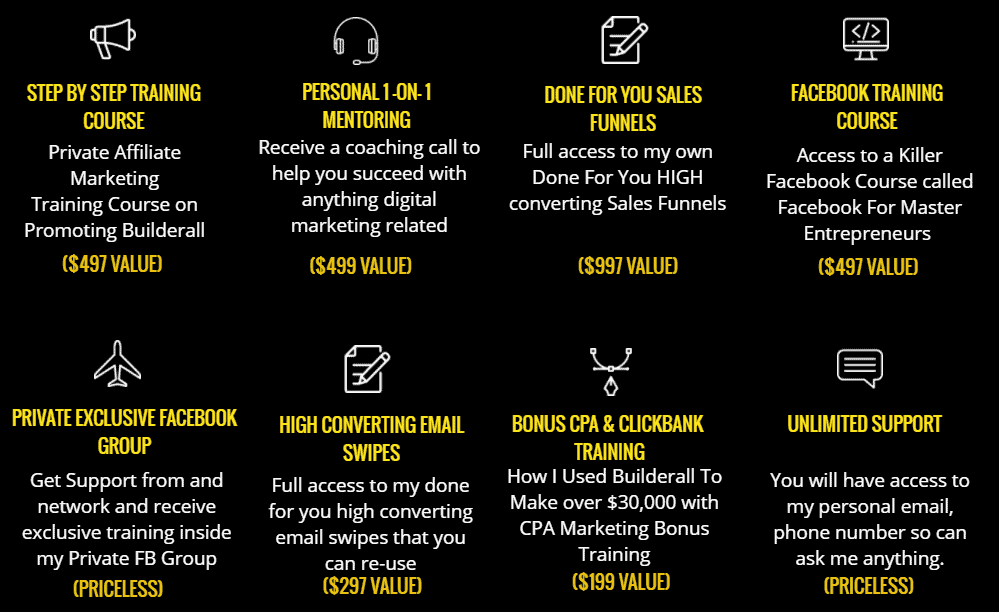Today, I’m going to show you 5 ways to do affiliate marketing keyword research using only free tools.
Regulars to this blog know that I’m a big fan of marketing automation and premium tools that make our lives easier.
However, I know that not everyone is going to be able to have access to all of the SEO tools to start an affiliate marketing website. Some people are just getting started and need to have a free option as well.
So I wanted to make this guide as accessible as possible so for this keyword research for affiliate marketing tutorial, we’re going to be using:
- Google search (SERP analysis)
- Answer The Public
- Keywords Everywhere
- SEO Minion
- Ubersugget
SEO Minion and Keywords Everywhere are both free Chrome Extensions. Answer The Public and UberSuggest are free keyword research tools.
Table of Contents
SERP Analysis
So the first thing that we’re going to do is to start by searching your main topics in Google and taking note of recommended searches and people also ask.
The topic that I’m going to be working with you on is “affiliate marketing for beginners”
Now, this is a highly competitive, highly coveted topic. Lots of people try to rank for this and want to rank for this as well. And that’s why I picked this topic for this affiliate marketing keyword research tutorial.
So I searched for “affiliate marketing for beginners” and as you can see, on the Google SERP results we’ve got Ahrefs ranking number one.
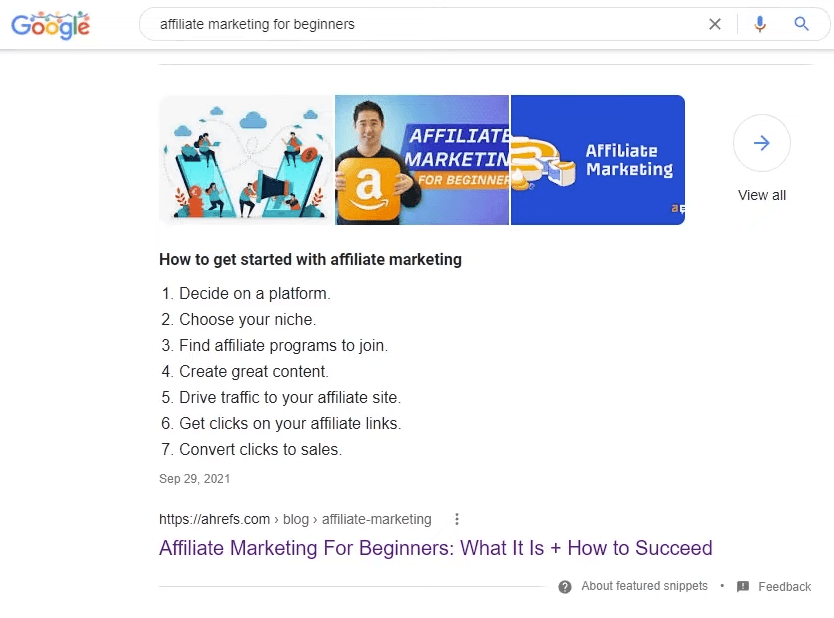
People Also Ask
And then we have this section called “People also ask” which includes a bunch of common questions that people also search on Google.
And if you expand these questions in the section you get the answer and then when you collapse them again, you’ll actually have more questions than before.
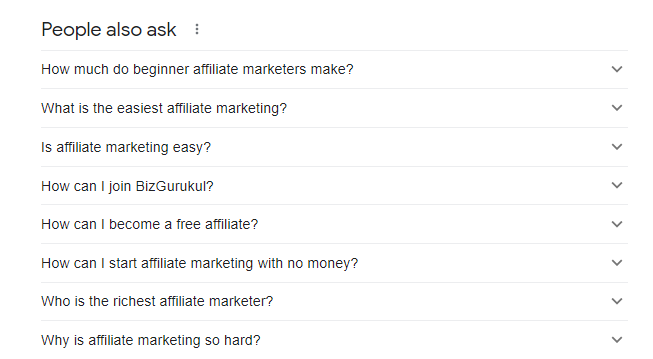
So what I’m going to do is I’m going to expand and collapse all of these so that I just get a huge list of questions. Maybe I won’t do all of them because it’s starting to get off topic a little bit, but basically, any that you like, you can expand and see the answer and then collapse and it’ll open up some more beneath it.
And then I’m just going to copy all of these questions and paste them into my Google Docs.
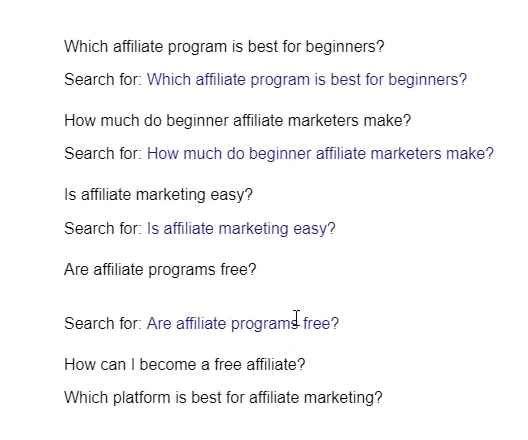
Usually, I don’t do this a lot because I have tools that do this for me and make it a lot faster like Frase.io but we’ll get into those at the end. For now, we’re just going to cover how to do it for free.
So anyway, now I’ve got all these great people also ask questions in my document.
And so let’s just take a look at what we’ve got here:
- Which affiliate program is best for beginners?
- How much do beginner affiliate marketers make?
- Is affiliate marketing easy?
- Are affiliate programs free?
- How can I become a free affiliate?
- Can you get rich with affiliate marketing?
- How do affiliates get paid?
- Does affiliate marketing work in 2021?
And more.
You don’t necessarily have to answer all of these questions in my article, but it would be a good idea to answer most of them.
And in fact, it would be a good idea to answer most of them explicitly, meaning potentially use these as subheadings, and then explicitly answer the question beneath the subheading.
All right so that is one place that you can mind for data. You can just do a search and then expand the people also ask questions and copy the questions and those make really good ideas for keywords.
Bottom Of a Google SERP – Related Topics
And then if you come down to the bottom of the SERP, you’ll find that there’s also a list of recommended related searches.
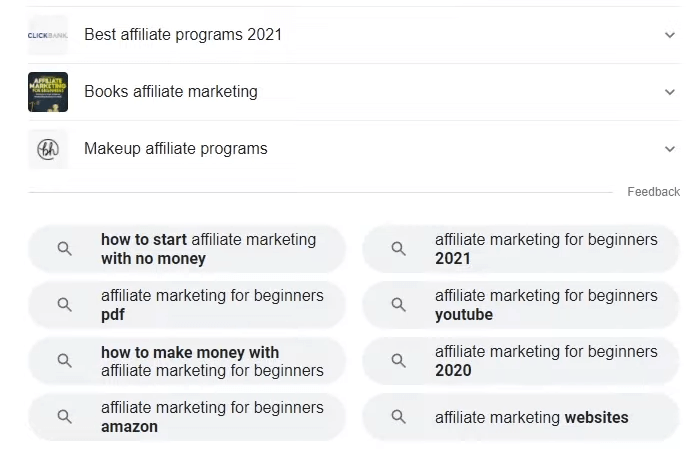
So you can use this to inform the intent of your article and to understand what people are searching for that is similar.
For example, this one is “how to start affiliate marketing with no money” which is very related to affiliate marketing for beginners.
So I might use that in my title so it will be “How to start affiliate marketing for beginners 2022” and I want to make sure that my title tag is 50-60 characters.
This one has 51 characters so it is an acceptable length. It could be a little bit longer, but as long as it’s under 60 characters it’s short enough to be viewed in the search results.
So now I have my title and I’ve got a bunch of questions I can potentially use for subheadings and to just generally inform my content.
Where do we go from here?
Now that we’ve taken note of the related searches and people also ask questions, the next method is to use what’s called “alphabet soup.
So I go to Google search and type in “affiliate marketing for” then I’ve got all these other keyword recommendations.
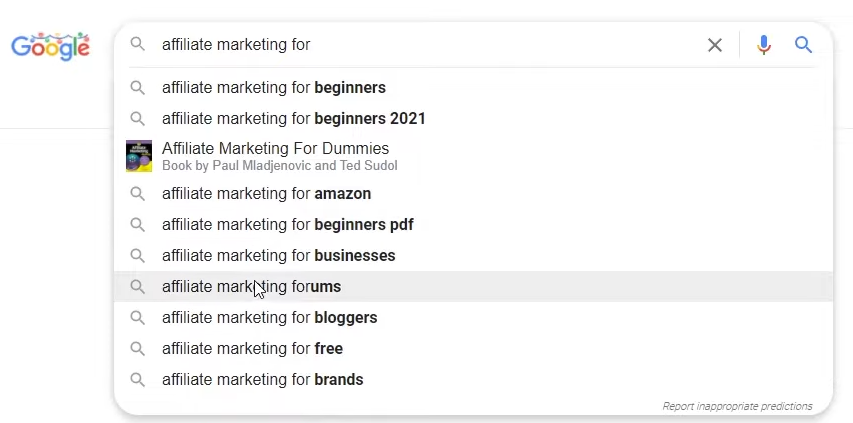
So we have:
- Affiliate marketing for Amazon
- Affiliate marketing for businesses
- Affiliate marketing forums
- Affiliate marketing for bloggers
- Affiliate marketing for free
This is why it’s called alphabet soup, by the way, because you can just go “affiliate marketing a…” and then you get all these keyword recommendations.
Then you can go “affiliate marketing b” and you get other keyword recommendations.
And you can go through the entire alphabet this way and get a ton of long-tail keyword recommendations.
And these long-tail keywords could be subheadings within this article on “how to start affiliate marketing for beginners” that I’m writing.
Or they could be the titles of separate articles which would act as a supporting article for my main article as cluster content and that way have something called content hub.
So that’s one way to do alphabet soup and you can also do it from the beginning from A-Z, and these are either subtopics that I can address in my article or there are things that I can turn into their own articles.
So that is the alphabet soup method and that’s a really good free method to find long-tail keywords that you can target in your SEO affiliate marketing post.
Answer The Public
The next way to do keyword research for affiliate marketing is by using Answer The Public which is another great free keyword research tool.
Basically, you put it in a topic in this case “affiliate marketing” and it’s going to actually mind Google for you and pull up a whole bunch of related questions.
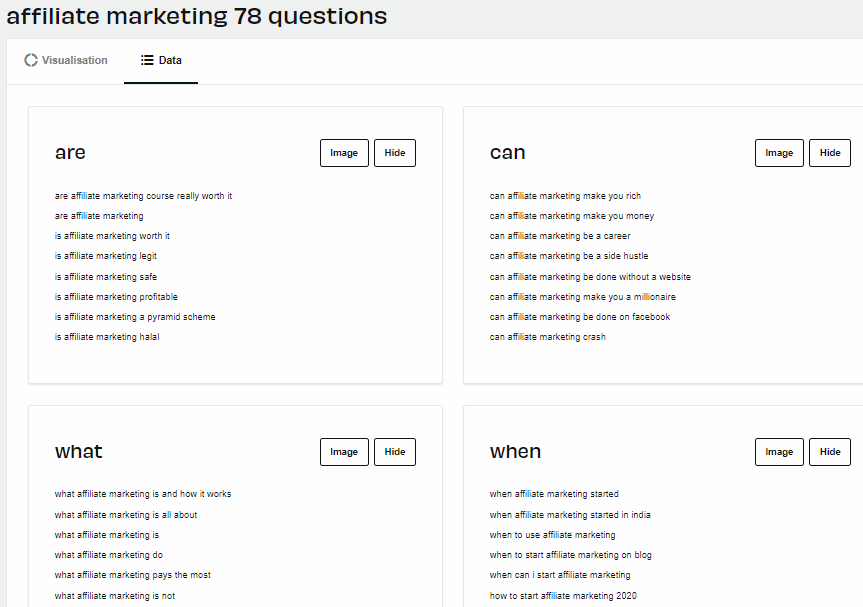
So these are all long-tail keywords that people search for even if they’re not necessarily all high volume. These are all topics and subtopics of affiliate marketing that people are interested in.
So this is a really powerful keyword research tool and I highly recommend that you use it, especially if you don’t have access to premium keyword research tools like SE Ranking.
Keywords Everywhere
The next method to perform keyword research for affiliate marketing is to use Keywords Everywhere which is a free SEO Chrome extension.
So to get started, inside the Chrome Web Store, you just need to add the Keywords Everywhere extension to your browser and you’re good to go.
You can also pin them to make them more accessible.
And so if I searched for this again, now that I have Keywords Everywhere installed, it’s going to give me a bunch of data at the bottom.
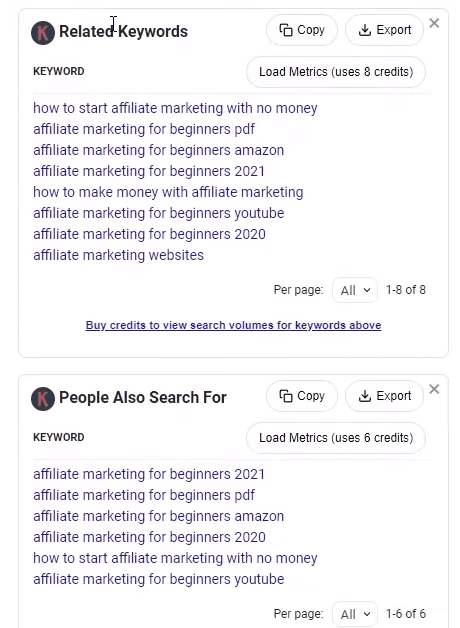
So here we have related keywords, people also search for, and long-tail keywords, and you can just easily copy these and add them to your document.
So now just from using these 3 free keyword research methods. I haven’t even used all of them and I’ve got 2 pages full of keywords I can cover in my affiliate article.
And it’s really the exact same data that premium keyword research tools access. It’s just, you just, it’s just not as easily easy to manage. It’s not as nicely presented and you don’t get as much data, for example, you don’t get search volume data.
SEO Minion
And the next step is using SEO Minion which is another free Chrome extension.
So here we have the “affiliate marketing for beginners” that I want to target and I’m going to turn on SEO Minion, then click “Analyze on-page SEO” and this is going to give me a bunch of data about the page, including all of their sub-headings, all of their, their headings and subheadings.
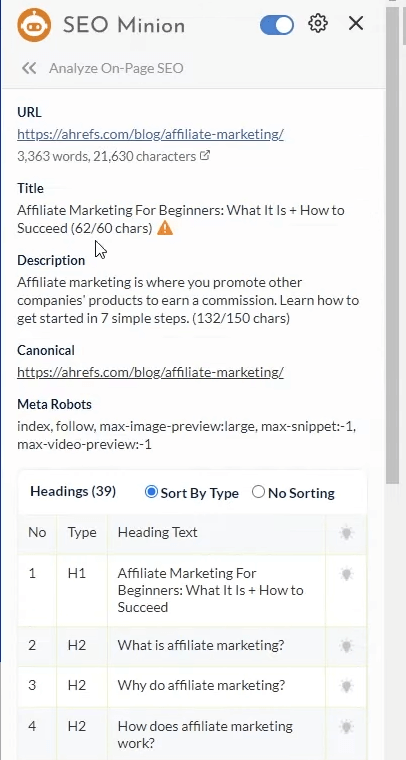
So I can just say show all headings and I’ve got all the rage to all the rage.
And what’s cool about SEO Minion is I can also download all of this data and then upload this CSV export.
So this is one way that you can spy on your competitors and see exactly what keywords your competitors are using and create a list of them that you can then use in your article.
UberSuggest
Next, you can check search volumes and find more keywords with UberSuggest which is a freemium keyword research tool.
Let’s say the main keyword I’m planning to target. Is “how to start affiliate marketing for beginners”.
And then a secondary keyword I’m going to be targeting is “how to start affiliate marketing”.
And the third variation of this keyword I’m targeting is “how to start affiliate marketing for beginners”.
Now I want to know what the search volume of all of these keyword variations is. So I’m going to go to UberSuggest.
💡 Note
If you’re just using UberSuggest for keyword research make sure that you use it sparingly because you only get 3 searches a day and then you have to wait until the next day. So only use this for things that you really want to know the search volume of.
So as you can see in the United States, this long-tail keyword gets 110 search volume a month and has an approximate SEO difficulty of 61 out of 100.
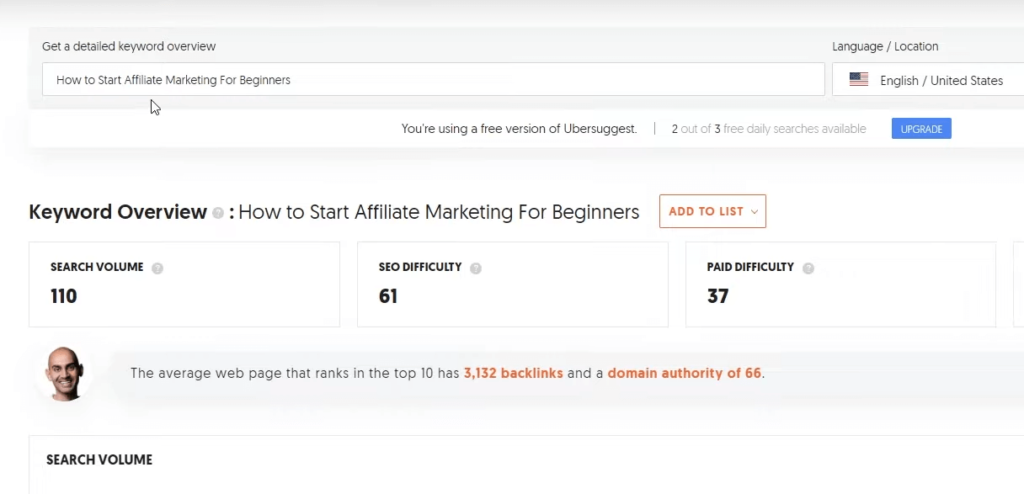
However when I just check on “how to start affiliate marketing”, you can see this has much more search volume.
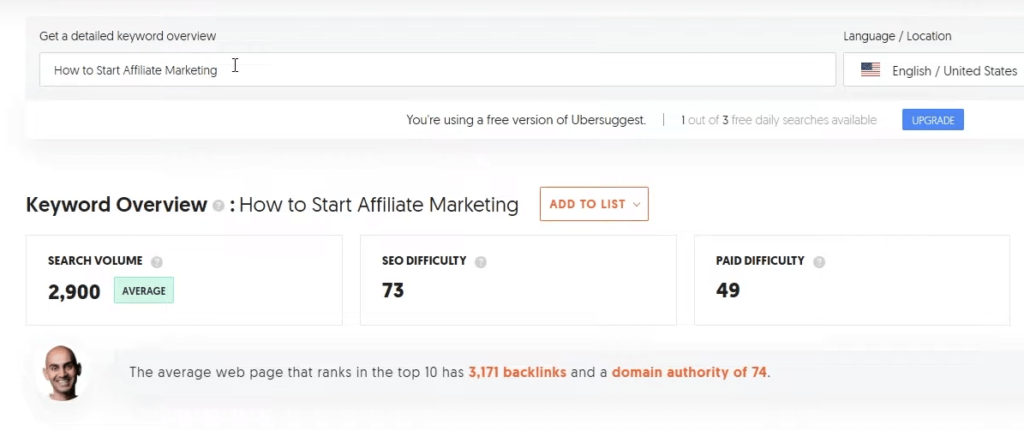
So if I managed to rank for “how to start affiliate marketing” and “how to start affiliate marketing for beginners”, that’s going to be over 3000 monthly searches.
And then if I do “affiliate marketing for beginners”, it has another 2,900 monthly searches.
So if I can rank for all 3 of those keywords, that’s just going to be a massive amount of top of the funnel traffic which could be a real business-altering type of thing to rank for.
Then that’s the power of SEO is that if you do it well. It can bring you a lot of traffic and potentially a lot of income pretty quickly.
Keyword Research For Affiliate Marketing Wrapping Up
So that is affiliate marketing keyword research in a nutshell. That is how you can find keywords, extract keywords, multiply keywords, map keywords, and then get keyword volumes all for free.
Hopefully, this tutorial will help you with your SEO efforts for your affiliate marketing website.




